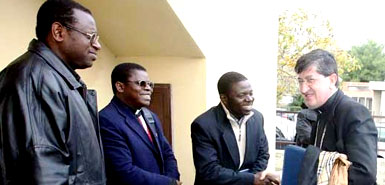
Uwayezu, far left, meets Giuseppe Betori, archbishop of Florence, who approved the Rwandan’s appointment
By Jon Swain
THE Vatican has come under renewed pressure to purge its ranks of suspected killers after a second Rwandan Catholic priest accused of involvement in the 1994 genocide was found to be working in Italy under an assumed name.
An international arrest warrant is being prepared by Rwanda for Father Emmanuel Uwayezu following the discovery that he is working in a parish at Empoli, near Florence. It will accuse him of direct complicity in the massacre of more than 80 students, aged from 12 to 20, at a Catholic school where he was headmaster.
One of the few survivors lives in Britain. She still has nightmares and is too afraid to be identified by name. Last week she identified Uwayezu and described how he brought soldiers to the school at Kibeho and conspired with them to have the Tutsi students killed.
“He seemed to be happy with what he was doing. He told us to stay in the classroom. Some people who were working in the kitchen were shot in front of his eyes but he did not say a word. Others were hacked to death, raped or buried alive,” she said. “Now Uwayezu is enjoying his life. Is he really a father [priest]?”
Uwayezu denied taking part in the genocide and said he had tried to save the students. He said their deaths still haunted him. He is a Hutu like another notorious Rwandan priest, Athanase Seromba, who joined the campaign to exterminate Rwanda’s Tutsi minority and who also ended up in Florence.
After the genocide they both escaped to Italy with the help of Catholic supporters and began new lives as priests with the approval of Florence’s archbishop. Seromba, who was found in Italy by The Sunday Times, is serving a life sentence after being convicted of slaughtering 2,000 of his parishioners by bulldozing his church as they cowered inside. He was the first priest to be tried by a United Nations war crimes tribunal for genocide and crimes against humanity.
For a long time the Vatican had vigorously proclaimed his innocence. It also questioned the objectivity of a Belgian court that had given two Rwandan Benedictine nuns long jail sentences for genocide.
It remains to be seen how it will react in Uwayezu’s case. He has modified his name slightly and is known to his parishioners as Wayezu.
In Rwanda in 1994, the Catholic church was the most powerful institution after the government, but some senior members sided openly with the Hutu extremist government and the church hierarchy failed to prevent the slaughter. In 100 days of killing, 800,000 members of the Tutsi minority were massacred. Some priests and nuns sided with the Hutu militias and joined in the slaughter.
Yesterday Rakiya Omaar, the director of African Rights, a human rights organisation that has investigated the genocide and which has issued a comprehensive report on Uwayezu’s activities during the genocide, called on the Catholic church and the Italian and Rwandan authorities to conduct their own investigation.
“All concerned will have drawn lessons from the Seromba case,” she said. “Denials and dismissals by the Catholic church eventually led to his conviction and imprisonment for the remainder of his life.”